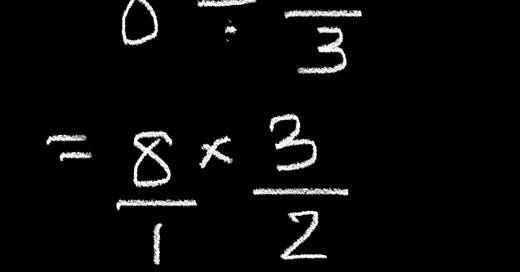The proverbial child asking, “But why?” persists in our household. At least once a week, when Aidan (he is 10) is working on Math, he gets to a concept and stops. He can’t move on before he fully understands why the numbers behave a certain way and what the relationship is between various operations.
I was not this way, especially in math.
I loved that there were rules.
I would learn the rule, apply the rule, complete my assignment and move on.
I didn’t really dive deeper, reserving my “why?” pondering to subjects like religion, philosophy and biology.
This week, Aidan was practicing dividing fractions. Immediately, the rule pops into my head, and I proudly contribute, “Oh yes, you multiply by the reciprocal.” I wasn’t equipped for the follow-up, “But why does that work, Mom?” I passed the homeschooling baton to my husband.
Later that day, Mike explained to me how he got Aidan to understand. He reminded me that by definition, a reciprocal is the number you multiply another number by to get 1 (a fraction’s inverse). I think maybe I knew this once, but I had clearly forgotten. Because of this, using reciprocals allows you to maintain integrity and balance when you shift mathematical operations (i.e., division to multiplication). It’s like balancing equations. I had to write it out:
As I did, little fireworks started going off in my brain. I pondered the very definition of a reciprocal: when you multiply by the reciprocal, you get a whole. This is a powerful reminder far beyond its mathematical application.
I am currently reading Robin Wall Kimmerer’s book, Braiding Sweetgrass. (It’s beautiful and one I highly recommend.) In it, she talks a lot about the idea of reciprocity - the relationship of the plants to the land, of plants with each other and how we fit into this earth equation as humans. When we take something, how can we give back so that our net is always whole, one?
What if we were to apply this concept of reciprocity to all aspects of our life - work, relationships, consumption? Thinking about balance in mathematical terms, as multiplying by the reciprocal is a beautiful way to think generally about our approach to balance.
We often treat reciprocals as a net zero transaction, you reciprocate a kindness to bring something back to neutral, “pay someone back.” But true reciprocity is not limited to addition or subtraction. Instead, it’s about restoration - finding the multiplier that will make something whole. It’s about shifting from a transactional to relational mindset. Sometimes you are the 2/3 and sometimes you are the 3/2.






